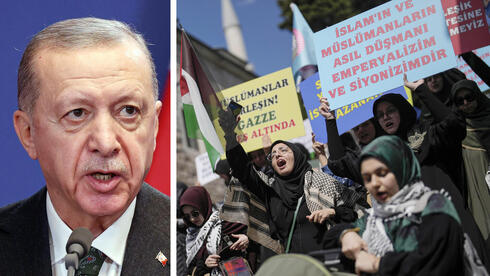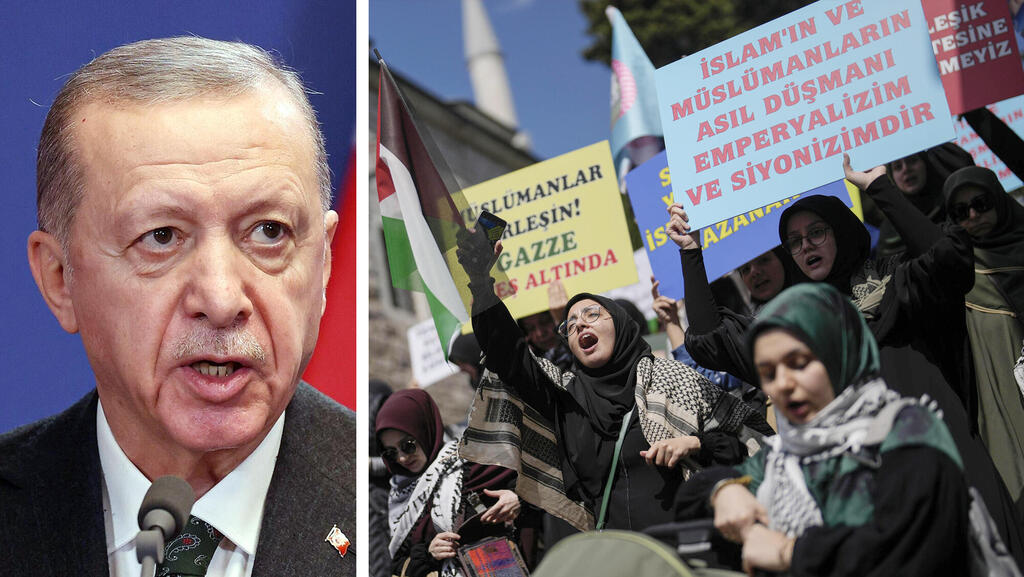
Analysis
Turkey's Erdogan trying to stop his political decline by boycotting Israel
After suffering a defeat in the local elections, Erdogan decided to change direction and announce an export embargo on Israel. The reason for this lies in the rise of a new Islamist force led by Fatih Erbakan. Erdogan hopes that playing the "Israeli card" will be able to stop Erbakan's rise, and the Israeli economy will pay the price
Considering the winds blowing from Ankara and Istanbul since October 7, Turkey's announcement Tuesday of an export embargo on Israel should not come as a surprise. What is surprising is the timing. Turkish President Recep Tayyip Erdogan has been attacking Israel and its leaders since the war in the Gaza Strip began, but has so far avoided taking drastic measures against it. Therefore the question arises - what motivated the Turkish preseident to change direction, and why precisely now?
The answer lies in the results of the local elections. In these elections, which Erdogan declared would be his last as a leader, his ruling Justice and Development party suffered a hit not seen since it came to power more than two decades ago. Erdogan's party lost the elections in all five of the country's largest cities and the percentage of votes it won at the national level decreased. Even in the cities where Erdogan's party managed to win, in most cases it was with a lower support rate than it achieved in the previous local elections in 2019.
1 View gallery


Turkish President Erdogan, Turkish protestors against Israel
(Photos: Akos Stiller/Bloomberg, AP Photo/Khalil Hamra)
The decline in the popularity of the Justice and Development party in the recent elections is related to the difficult economic situation that characterizes Turkey and which millions of Turks feel every day, either due to the rapid inflation or the decrease in their purchasing power. However, the issue of continued trade with Israel was constantly in the background of the elections, especially among conservative voters, who traditionally lean in favor of Erdogan's party. At Erdogan's rallies before the elections, signs were raised condemning the continuation of trade with Israel, and this continued even after the elections. Last Saturday, for example, in the central Taksim Square in Istanbul, a stormy demonstration was held to protest the continuation of trade relations with Israel and 43 demonstrators were arrested.
Turkey ultimately announced on Tuesday that it will restrict exports of a wide range of products to Israel until a ceasefire is declared in Gaza. The measures apply to the export of products from 54 different categories, including iron, marble, steel, cement, aluminium, brick, fertilizer, construction equipment and products, aviation fuel, and more.
The biggest winner from the uproar is a new Islamist party - the "New Welfare Party" - which is challenging Erdogan from the right. This party defeated Erdogan's party in three districts. It is not for nothing that President Erdogan admitted in closed conversations quoted in the Turkish media that the loss in the elections was due to his party's inability to explain the continuation of trade with Israel.
At the head of the new welfare party is a young leader named Fatih Erbakan, the son of the former Prime Minister of Turkey, who previously founded an Islamist party whose members included Erdogan himself at the beginning of his career. Throughout the current election campaign, the young Erbakan attacked Erdogan and the members of his party, claiming that they are allowing trade with Israel to continue and that companies associated with individuals from Erdogan's party are profiting thanks to trade with Israel. Erbakan's success in the last elections at the expense of the ruling party created a fear among Erdogan and his people that an Islamist governing alternative is developing under their noses. Erdogan and his people are trying to stop Erbakan's rise, and one of the ways to do this is to play the "Israeli card".
Erdogan government's attempts to convey to the public that trade with Israel is declining have not been convincing so far. Earlier this week, as part of the persuasion attempts, the Turkish Ministry of Commerce claimed that the value of trade between Turkey and Israel has decreased significantly since the beginning of the war in Gaza. According to data published by the Turkish Ministry of Commerce, from October 7 to March 20, the value of trade between the two countries decreased by almost 33%. Turkey's exports to Israel fell by 30% while Turkish imports from Israel fell by 43.4%. According to reports in Turkey, the bulk of trade with Israel from the Turkish side is done by private companies, while government bodies have reduced their activity. The boycott announced on Tuesday is expected to further decrease trade with Israel, and Erdogan hopes that at the same time it will also restore his party's popularity.













